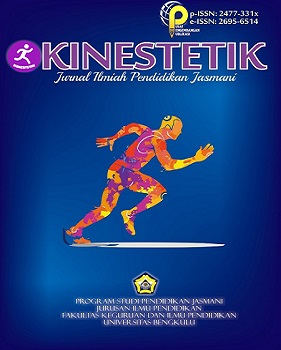Main Article Content
Abstract
This study aims to trace the achievements of athletes from several sports. This study used a descriptive qualitative method. Data collection techniques using observation, questionnaires, and documentation. In this study, the subjects of the study were athletes who were still actively training. The results showed that the social agent aspect had an impact on athlete achievement, namely: parents (74%) in the good category, coaches (81%) in the good category, teachers (78%) in the good category, peers (74%) in the good category. good environment (87%) in very good category, mass media (78%) in good category, and the correlation between social agent and achievement is 80% in good category. Based on the research results, each of these social agents has a role in achievement. High or low athlete achievement is not only the social agent aspect that influences it. Achievement was created from many factors that influence it.
Keywords
Article Details
Copyright (c) 2023 Irpani, Albadi Sinulingga, Suryadi Damanik, Rafika Ardilla

This work is licensed under a Creative Commons Attribution-ShareAlike 4.0 International License.
Authors who publish in this journal agree with the following terms:- Authors retain copyright and grant the journal right of first publication with the work simultaneously licensed under a Creative Commons Attribution-ShareAlike 4.0 (CC BY-SA) that allows others to share the work with an acknowledgement of the work's authorship and initial publication in this journal.
- Authors are able to enter into separate, additional contractual arrangements for the non-exclusive distribution of the journal's published version of the work (e.g., post it to an institutional repository or publish it in a book), with an acknowledgement of its initial publication in this journal.
- Authors are permitted and encouraged to post their work online (e.g., in institutional repositories or on their website) prior to and during the submission process, as it can lead to productive exchanges, as well as earlier and greater citation of published work (See The Effect of Open Access).
- This work is licensed under a Creative Commons Attribution-ShareAlike 4.0 International License.
References
- Agung, Z. (2016). Metode penelitian kuantitatif. Yogyakarta: Pandiva Buku.
- Anthony, D. (2018). Introduction To Sociology. New York: Library of Congress Cataloging in Publication Data.
- Atrizka, D, Prima, S. (2017). Tinjauan Psikologis Peran Keluarga Khususnya Orang Tua Mendampingi Anak & Remaja. Majalah Ilmiah Politeknik Mandiri Bina Prestasi. 2.
- Bangun, S. Y. (2019). Peran Pelatih Olahraga Ekstrakurikuler Dalam Mengembangkan Bakat Dan Minat Olahraga Pada Peserta Didik. Jurnal Prestasi, 2(4), 29.
- Bissell, H, J. M., & Loken, E. (2009). The role of friends in early adolescents’ academic self-competence and intrinsic value for math and english. Journal of Youth and Adolescence, 38(1), 41–50.
- Bourn, D. (2016). Teachers as agents of social change. International Journal of Development Education and Global Learning, 7(3), 63–77.
- Delaney, T. (2014). The sociology of sports: an introduction. United States of America: Library of Congress Cataloguing in Publication Data.
- Laker, A. (2002). The Sociology of Sport and Physical Education. NewYork: Library of Congress Cataloging in Publication Data.
- Sandu, M. Ali Sodik. (2015). Dasar Metodologi Penelitian.Yogyakarta: Literasi Media Publishing.
- Sinulingga, A. dan N. H. (2014). Teori Dasar Motor Kontrol Dalam Pendidikan Jasmani dan Olahraga Pada Usia Dini. Medan: Unimed Press.
- Sugiyono. (2013). Metode Penelitian Kuantitatif, Kualitatif, dan R & D (19th ed.). Bandung:Alfabeta.
- Sugiyono. (2015). Metode Penelitian Pendidikan (Pendekatan Kuantitatif, Kualitatif, dan R&D). Bandung: Alfabeta.
- Suharsimi, A. (2010). Prosedur Penelitian Suatu Pendekatan Praktik. Yogyakarta: PT. Rineka Cipta.
- Soyomukti, N. (2012). Pengantar Ilmu Komunikasi. Yogyakarta: Ar-Ruzz Media.
- Thompson, J. . P. (2009). IntroductIon to coaching The Official IAAF Guide to Coaching Athletics. Moscow: Descartes.
- Undang-Undang Republik Indonesia Nomor 11 Tahun 2022 Tentang Keolahragaan. Jakarta: Kemenpora
- Zahroh, S., & Na’imah, N. (2020). Peran Lingkungan Sosial terhadap Pembentukan Karakter Anak Usia Dini di Jogja Green School. Jurnal PG-PAUD Trunojoyo : Jurnal Pendidikan Dan Pembelajaran Anak Usia Dini, 7(1), 1–9.
References
Agung, Z. (2016). Metode penelitian kuantitatif. Yogyakarta: Pandiva Buku.
Anthony, D. (2018). Introduction To Sociology. New York: Library of Congress Cataloging in Publication Data.
Atrizka, D, Prima, S. (2017). Tinjauan Psikologis Peran Keluarga Khususnya Orang Tua Mendampingi Anak & Remaja. Majalah Ilmiah Politeknik Mandiri Bina Prestasi. 2.
Bangun, S. Y. (2019). Peran Pelatih Olahraga Ekstrakurikuler Dalam Mengembangkan Bakat Dan Minat Olahraga Pada Peserta Didik. Jurnal Prestasi, 2(4), 29.
Bissell, H, J. M., & Loken, E. (2009). The role of friends in early adolescents’ academic self-competence and intrinsic value for math and english. Journal of Youth and Adolescence, 38(1), 41–50.
Bourn, D. (2016). Teachers as agents of social change. International Journal of Development Education and Global Learning, 7(3), 63–77.
Delaney, T. (2014). The sociology of sports: an introduction. United States of America: Library of Congress Cataloguing in Publication Data.
Laker, A. (2002). The Sociology of Sport and Physical Education. NewYork: Library of Congress Cataloging in Publication Data.
Sandu, M. Ali Sodik. (2015). Dasar Metodologi Penelitian.Yogyakarta: Literasi Media Publishing.
Sinulingga, A. dan N. H. (2014). Teori Dasar Motor Kontrol Dalam Pendidikan Jasmani dan Olahraga Pada Usia Dini. Medan: Unimed Press.
Sugiyono. (2013). Metode Penelitian Kuantitatif, Kualitatif, dan R & D (19th ed.). Bandung:Alfabeta.
Sugiyono. (2015). Metode Penelitian Pendidikan (Pendekatan Kuantitatif, Kualitatif, dan R&D). Bandung: Alfabeta.
Suharsimi, A. (2010). Prosedur Penelitian Suatu Pendekatan Praktik. Yogyakarta: PT. Rineka Cipta.
Soyomukti, N. (2012). Pengantar Ilmu Komunikasi. Yogyakarta: Ar-Ruzz Media.
Thompson, J. . P. (2009). IntroductIon to coaching The Official IAAF Guide to Coaching Athletics. Moscow: Descartes.
Undang-Undang Republik Indonesia Nomor 11 Tahun 2022 Tentang Keolahragaan. Jakarta: Kemenpora
Zahroh, S., & Na’imah, N. (2020). Peran Lingkungan Sosial terhadap Pembentukan Karakter Anak Usia Dini di Jogja Green School. Jurnal PG-PAUD Trunojoyo : Jurnal Pendidikan Dan Pembelajaran Anak Usia Dini, 7(1), 1–9.
